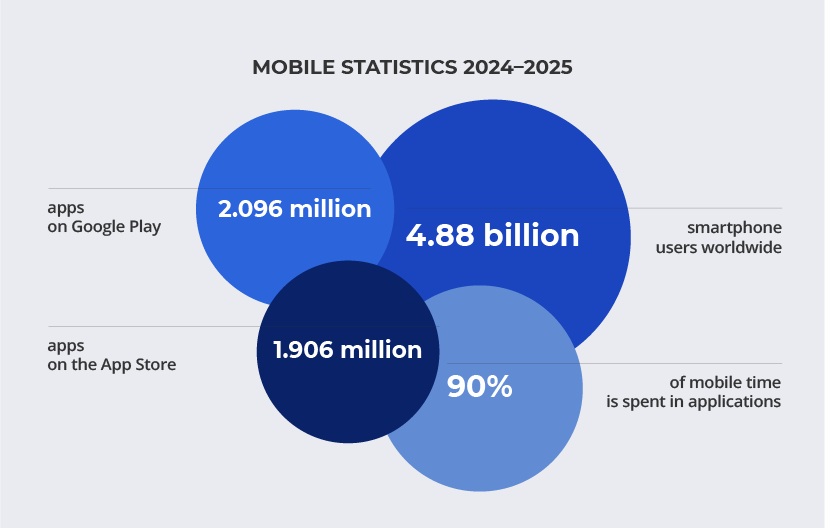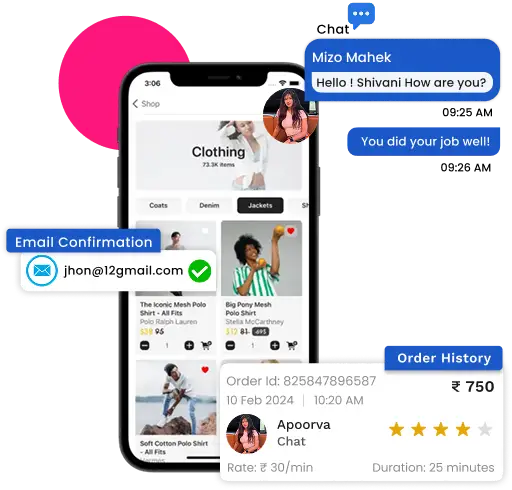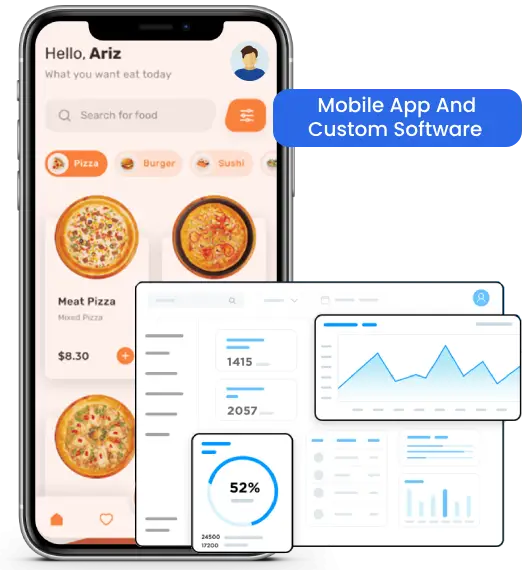Mobile app development continues to evolve at a rapid pace. Every year, new technologies and user preferences emerge, shaping the way apps are built and used. As we approach 2025, the trends in mobile app development are pushing the boundaries of what’s possible on mobile devices. From AI-driven experiences to enhanced security features, this blog covers the top 15 trends expected to dominate the mobile app development landscape in 2025.
Latest Mobile App Development Trends
As mobile app development evolves, staying ahead of trends is essential for success. In 2025, we’ll see innovations shaping user experiences and technology. Here are the top 15 latest mobile app development trends to watch for in the coming year.
Artificial Intelligence and Machine Learning Integration
Artificial Intelligence (AI) and Machine Learning (ML) are no longer just buzzwords in the tech world. These technologies are already making their way into mobile apps, allowing for smarter, more personalized user experiences. In 2025, AI and ML will be crucial in powering virtual assistants, predictive analytics, and recommendation engines. These technologies will help apps learn from user behavior, delivering tailored content and services.
Moreover, AI chatbots will be more common in apps, providing seamless customer support and enhancing user engagement. ML algorithms will help apps improve their functionality over time, making them more efficient and responsive.
6G Connectivity
The roll-out of 6G technology will change the way mobile apps are developed. The faster internet speeds and lower latency offered by 6G will enable more advanced app functionalities, such as real-time video streaming, cloud gaming, and augmented reality experiences. With 6G, apps can handle more data-intensive tasks, providing smoother, faster, and more interactive experiences for users.
For developers, 6G means an opportunity to create apps that are more feature-rich and responsive, taking full advantage of the technology’s capabilities.
Augmented Reality (AR) and Virtual Reality (VR)
Augmented Reality (AR) and Virtual Reality (VR) will continue to gain traction in mobile app development. In 2025, AR and VR will go beyond gaming, entering industries such as retail, education, healthcare, and real estate. With AR, users can visualize products in their space before purchasing or get detailed navigation instructions in real-time. VR, on the other hand, will be used for immersive training simulations and virtual tours.
These technologies are becoming more accessible to developers, thanks to the increased processing power of mobile devices and the growing availability of AR/VR development kits.
Cross-Platform Development
Developing mobile apps for multiple platforms has always been a challenge for developers. Cross-platform development tools have been evolving, and in 2025, they will be more advanced than ever. Developers will be able to write code once and deploy it across both iOS and Android devices without sacrificing performance or quality.
This trend will save businesses time and money while ensuring a wider reach for their apps. Technologies such as Flutter and React Native will continue to dominate, enabling faster and more efficient development processes.
Internet of Things (IoT) Integration
The Internet of Things (IoT) has already started to impact mobile apps, but its influence will grow exponentially in the coming years. In 2025, mobile apps will connect more seamlessly with IoT devices, allowing users to control everything from home appliances to vehicles directly from their smartphones.
With IoT, apps can create smarter ecosystems, offering personalized automation based on user preferences. Whether it’s adjusting the thermostat, monitoring health metrics, or managing security systems, IoT integration will make apps more versatile and user-friendly.
Blockchain Technology
Blockchain technology, widely known for powering cryptocurrencies, is finding its way into mobile apps in 2025. The decentralized and secure nature of blockchain makes it ideal for applications requiring secure transactions, such as mobile banking apps, e-commerce platforms, and digital wallets.
Mobile apps built on blockchain technology will provide higher levels of security and transparency, particularly for applications involving sensitive data or financial transactions. The integration of blockchain will also help reduce fraud and enable peer-to-peer transactions without intermediaries.
Voice-Activated Apps
Voice recognition technology is improving rapidly, and mobile apps are incorporating it to enhance user experience. Voice-activated apps will be more intuitive in 2025, allowing users to control apps through natural language. Virtual assistants, like those built into smartphones, will be able to perform more complex tasks, such as booking appointments, setting reminders, and controlling smart home devices.
As voice search becomes more popular, app developers will need to optimize their apps for voice commands to stay competitive in the market.
Cloud-Based Mobile Apps
Cloud technology is revolutionizing the way apps store and manage data. In 2025, mobile apps will increasingly rely on cloud-based infrastructure to store data, ensuring that users can access their information from any device, at any time. Cloud-based apps also allow for faster updates and better scalability, making it easier for businesses to deliver new features to users.
With cloud computing, users no longer need to worry about storage limitations on their devices, and developers can focus on building feature-rich apps without worrying about the constraints of local storage.
Mobile App Security
As mobile apps become an essential part of our daily lives, security will be a top priority. In 2025, we’ll see more advanced mobile app security features, such as biometric authentication (face recognition and fingerprint scanning), multi-factor authentication, and end-to-end encryption.
Hackers are constantly finding new ways to exploit vulnerabilities, making it essential for app developers to implement robust security measures. Security features will become more integrated into the app’s core functions, ensuring users feel confident in the protection of their personal information.
Wearable Devices Integration
Wearable devices, such as smartwatches and fitness trackers, are becoming more sophisticated and widely used. In 2025, mobile apps will integrate more deeply with these devices, enabling users to manage health data, receive notifications, and perform other tasks directly from their wearables. This will make wearables an essential tool for enhancing daily life and wellness management.
For developers, this means creating apps that work seamlessly across mobile devices and wearables, ensuring that users can access the same data and services across platforms. The rise of wearable devices will also push developers to innovate in health-related apps, providing real-time data analysis and personalized health recommendations. Wearable app development will be key to capitalizing on this trend and offering unique, user-centric experiences.
Mobile App Analytics
Data-driven decision-making is more important than ever. Mobile app developers will increasingly rely on analytics tools to track user behavior, engagement, and performance metrics. In 2025, more advanced analytics will be integrated into mobile apps, providing real-time insights that can help businesses make data-backed decisions.
App analytics will help developers understand how users interact with the app, identify pain points, and continuously optimize the app experience. This will result in higher user retention rates and improved customer satisfaction.
On-Demand Mobile Apps
The on-demand economy is thriving, and mobile apps are at the heart of it. From food delivery to ride-sharing services, on-demand apps are offering convenience and flexibility to users. In 2025, the demand for on-demand apps will continue to rise, as consumers increasingly expect instant access to services.
Developers will need to focus on creating apps that are easy to navigate, offer quick transactions, and provide real-time updates to users. The ability to integrate payment gateways, track orders, and provide notifications will be essential features for on-demand mobile apps.
Mobile App Personalization
Personalization is key to improving user experience. In 2025, mobile apps will offer more personalized experiences, driven by data analytics, AI, and machine learning. Apps will adapt to users’ preferences, offering customized content, recommendations, and notifications based on individual behaviors and interests.
With personalized experiences, users will feel more engaged with the app, leading to higher retention rates and increased customer loyalty.
Mobile Payment Solutions
Mobile payments are becoming increasingly popular as consumers opt for faster, contactless payment methods. In 2025, mobile payment solutions will be more integrated into everyday life, with apps offering seamless transactions for everything from groceries to entertainment.
Developers will need to focus on creating secure and easy-to-use mobile payment features, ensuring that users can make transactions effortlessly and safely. Biometric authentication and encryption will be key components of mobile payment solutions in the coming years.
Progressive Web Apps (PWAs)
Progressive Web Apps (PWAs) are web applications that behave like native mobile apps, offering features such as offline access, push notifications, and fast loading times. PWAs are gaining popularity due to their ability to provide a native app experience without requiring users to download them from app stores.
As the demand for cross-platform solutions increases, PWAs will continue to rise in popularity. They offer a more cost-effective and efficient way for businesses to develop apps that work across both Android and iOS platforms.
Summing Up Everything
The mobile app development landscape is evolving rapidly, and 2025 will bring exciting new trends and technologies that will reshape the way apps are built and used. From AI and ML integration to the growth of 6G connectivity and augmented reality, mobile apps will offer more personalized, immersive, and efficient experiences for users. AI-powered features such as smart recommendations and predictive analytics will enhance user engagement, while 6G will enable faster, more responsive apps, unlocking new possibilities for real-time data processing. Augmented reality will revolutionize industries such as retail, gaming, and healthcare, offering users innovative and interactive experiences.

To stay ahead in this competitive market, custom mobile app development using a modern technology platform is essential. It allows developers to build scalable, flexible, and high-performing apps, leveraging the latest trends like cloud computing, IoT, and blockchain. Dreamer Technoland specializes in creating custom mobile applications and web applications that seamlessly integrate these advanced technologies, ensuring your app not only meets but exceeds modern user expectations. As these technologies continue to evolve, our developers stay ahead of the modern trends to ensure that their apps remain competitive, relevant, and highly functional in an ever-changing market.



